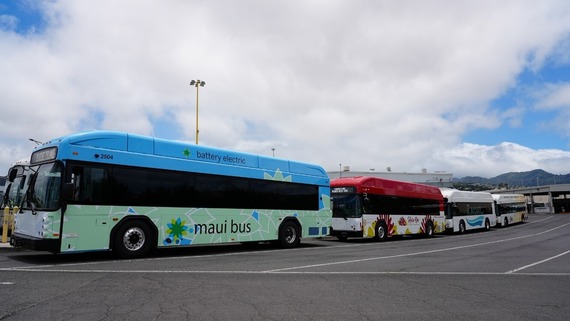Honolulu, Hawaiʻi – The state of Hawaiʻi Department of Transportation (HDOT), in partnership with the counties, has unveiled new all-electric, zero-emission buses, with some specifically bound for Hawaiʻi Island. These new buses, manufactured by Gillig, represent a significant step toward a sustainable future for public transportation across the state.
“The arrival of these new alternative energy, low-emission buses will provide our residents and visitors with additional transportation options that will help keep our communities connected,” said Hawaiʻi Governor Josh Green, M.D. He emphasized the state’s ongoing effort to reduce dependence on imported fossil fuels and enhance energy security, thanking the Federal Transit Administration (FTA) for grant funding that supported the bus acquisitions and infrastructure upgrades.
This delivery will see 12 diesel buses across Kauaʻi, Maui, and Hawaiʻi Island replaced with these battery-electric models. For each diesel bus replaced, there’s an estimated reduction of 1.445 tons of nitrogen oxides (NOx) emissions over its lifetime, contributing to a total reduction of approximately 17.34 tons of greenhouse gas emissions across the three counties.
The federal FTA provided $11.2 million to the Zero Emission bus project through its “Low or No Emissions” competitive grant and “Buses and Bus Facilities” formula program, covering a portion of the project’s total $16.6 million cost. The Hawaiʻi State Energy Office also contributed $3.53 million from the Volkswagen Settlement funds, with the remaining amount covered by the participating counties.
All Hawaiʻi counties have set a goal to convert their public bus fleets to 100% renewable fuels by 2035, aligning with the broader state sustainability goals.

Hawaiʻi Island’s Mayor Kimo Alameda highlighted the benefits for the Big Island: “These new electric buses are a significant step toward reducing our emissions and expanding sustainable transportation options for our residents. They are a win both for our environment and the people of Hawaiʻi. Mahalo to our federal and state partners for helping us make this forward-thinking investment possible.” Mayor Alameda noted that the new buses are expected to reduce emissions, improve air quality, and protect public health, particularly benefiting residential, rural, and school zones on Hawaiʻi Island susceptible to air pollutants. The replacement of diesel buses directly reduces diesel particulate matter and greenhouse gas emissions.
Mayors from Kauaʻi and Maui also expressed enthusiasm for the new buses and their environmental benefits. Honolulu is also in the process of acquiring more zero-emission buses to add to its existing fleet and is constructing new charging stations island-wide.